|
|
|
Sort Order |
|
|
|
Items / Page
|
|
|
|
|
|
|
| Srl | Item |
| 1 |
ID:
045704


|
|
|
|
|
| Publication |
New Delhi, Sterling Publishers Private Limited, 1986.
|
| Description |
viii, 272p.hbk
|
| Standard Number |
812070603X
|
|
|
|
|
|
|
|
|
|
|
|
Copies: C:1/I:0,R:0,Q:0
Circulation
| Accession# | Call# | Current Location | Status | Policy | Location |
| 026895 | 949.7703/ZHI 026895 | Main | On Shelf | General | |
|
|
|
|
| 2 |
ID:
171447
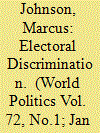

|
|
|
|
|
| Summary/Abstract |
Under what conditions do elections produce racially discriminatory outcomes? This article proposes electoral discrimination as an electoral mechanism for racial marginalization in indigenous and Afro-descendant Latin America. Electoral discrimination occurs when voters are mobilized under differential terms of electoral inclusion based on their observable characteristics. Using the 2010–2014 rounds of the AmericasBarometer and a conjoint experiment, the author finds that skin color is a robust predictor of vote buying across countries in the region with large, visible black and indigenous populations. A significant portion of the relationship between skin color and vote buying is due to the disproportionate impacts of race-neutral targeting criteria on dark-skinned voters. Observed differences in wealth, political and civic engagement, partisanship, political interest, interpersonal trust, and geography together explain a portion of the skin color–client gap, although the individual contribution of each of these factors differs by country. In addition, the author finds an independent relationship between skin color and vote buying over and above these race-neutral factors. The argument and findings in this article speak broadly to the consequences of electoral mobilization in ethnoracially stratified states in Latin America and beyond.
|
|
|
|
|
|
|
|
|
|
|
|
|
|
|
|
| 3 |
ID:
134333
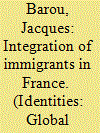

|
|
|
|
|
| Summary/Abstract |
This article seeks to identify the different factors that have facilitated or impeded the integration of immigrants in France from a historical perspective. Its aim is to shed light on the contemporary debates on the alleged failure of the republican integration model. First, we will show that – with the formation of the nation state – the integration of migrants was a constitutive element of the social cohesion of French society. Later, and during periods of xenophobia in particular, immigrants were classified according to their ability to assimilate into the French society. Since the 1970s, the double-barrelled integration question – concerning migrants and social cohesion – has reappeared. Within this context, the ‘colour-blind’ French republican model has been challenged, primarily from an economic perspective, not only by persistent social inequalities, but also, in its quintessence, by demands for cultural recognition. These factors have reinforced racial discrimination, the success of the populist extreme right and recurrent assimilation pressure.
|
|
|
|
|
|
|
|
|
|
|
|
|
|
|
|
| 4 |
ID:
192966
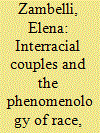

|
|
|
|
|
| Summary/Abstract |
Drawing from ethnographic research in England, this article discusses interracial, Black-white couples’ perceptions and experiences of racism and racial discrimination. Empirically, it enlarges scholarship’s prevailing focus on the effects of anti-Black racism on their social worlds, to an exploration of the relationship between race, place and space. More specifically, it discusses how partners’ differently racialised and gendered subjectivities impact their perceptions of being or not the object of interracial couple-based discrimination in public spaces, their residential choices, and their selection of leisure travel destinations. Use of an intersectional lens and the inclusion of both opposite- and same-sex couples contribute to mitigating the currently underexplored role of social class and sexuality in the shaping of interracial couples’ everyday lives. Theoretically, the article contributes to the study of whiteness as habitus and phenomenology: focusing in particular on how race mediates partners’ spatialised perceptions of dis/comfort and un/safety.
|
|
|
|
|
|
|
|
|
|
|
|
|
|
|
|
| 5 |
ID:
116225
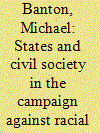

|
|
|
|
|
| Publication |
2012.
|
| Summary/Abstract |
Since 1970, states that are parties to the International Convention on the Elimination of Racial Discrimination have been reporting on the implementation of their treaty obligations. In the first two decades, states assumed the right to define the issues. Because of changes in the practice of the treaty-monitoring body, nongovernmental organizations in the more democratic states have been increasingly able to contribute alternative perspectives. This has been a significant step in the development of global civil society.
|
|
|
|
|
|
|
|
|
|
|
|
|
|
|
|
| 6 |
ID:
157951
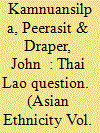

|
|
|
|
|
| Summary/Abstract |
This article presents an anatomy of the 2011 Thailand Country Report to the Committee responsible for the UN Convention for the Elimination of All Forms of Racial Discrimination, in which Thailand recognized its largest ethnic minority community, the Thai Lao, to the international community. The article analyses the Country Report as well as the deliberations of the Committee in dialogue with the Thailand Country Delegation. It provides a policy context for the Country Report, including Thailand’s classification of ethnic communities. The article argues the need to minimize racialized discrimination as regards the Thai Lao. Five policy issues, framed in the context of inclusion and which arise from the recognition of the Thai Lao by the Country Report, are considered. The article concludes by discussing how the Thai Lao may be better included in Thailand via political developments towards a social democracy in Thailand, for social democracy can recognize sociocultural rights.
|
|
|
|
|
|
|
|
|
|
|
|
|
|
|
|
| 7 |
ID:
103696


|
|
|
|
|
| Publication |
2011.
|
| Summary/Abstract |
Racial earnings inequalities in the United States diminished significantly over the three decades following World War II, but since then have not changed very much. Meanwhile, black-white disparities in employment have become increasingly pronounced. What accounts for this historical pattern? Sociologists often understand the evolution of racial wage and employment inequality as the consequence of economic restructuring, resulting in narratives about black economic fortunes that emphasize changing skill demands related to the rise and fall of the industrial economy. Reviewing a large body of work by economic historians and other researchers, this article contends that the historical evidence is not consistent with manufacturing- and skills-centered explanations of changes in relative black earnings and employment. Instead, data from the 1940s onward suggest that racial earnings inequalities have been significantly influenced by political and institutional factors-social movements, government policies, unionization efforts, and public-employment patterns-and that racial employment disparities have increased over the course of the postwar and post-1970s periods for reasons that are not reducible to skills. Taking a broader historical view suggests that black economic fortunes have long been powerfully shaped by nonmarket factors and recenters research on racial discrimination as well as the political and institutional forces that influence labor markets.
|
|
|
|
|
|
|
|
|
|
|
|
|
|
|
|
|
|
|
|
|